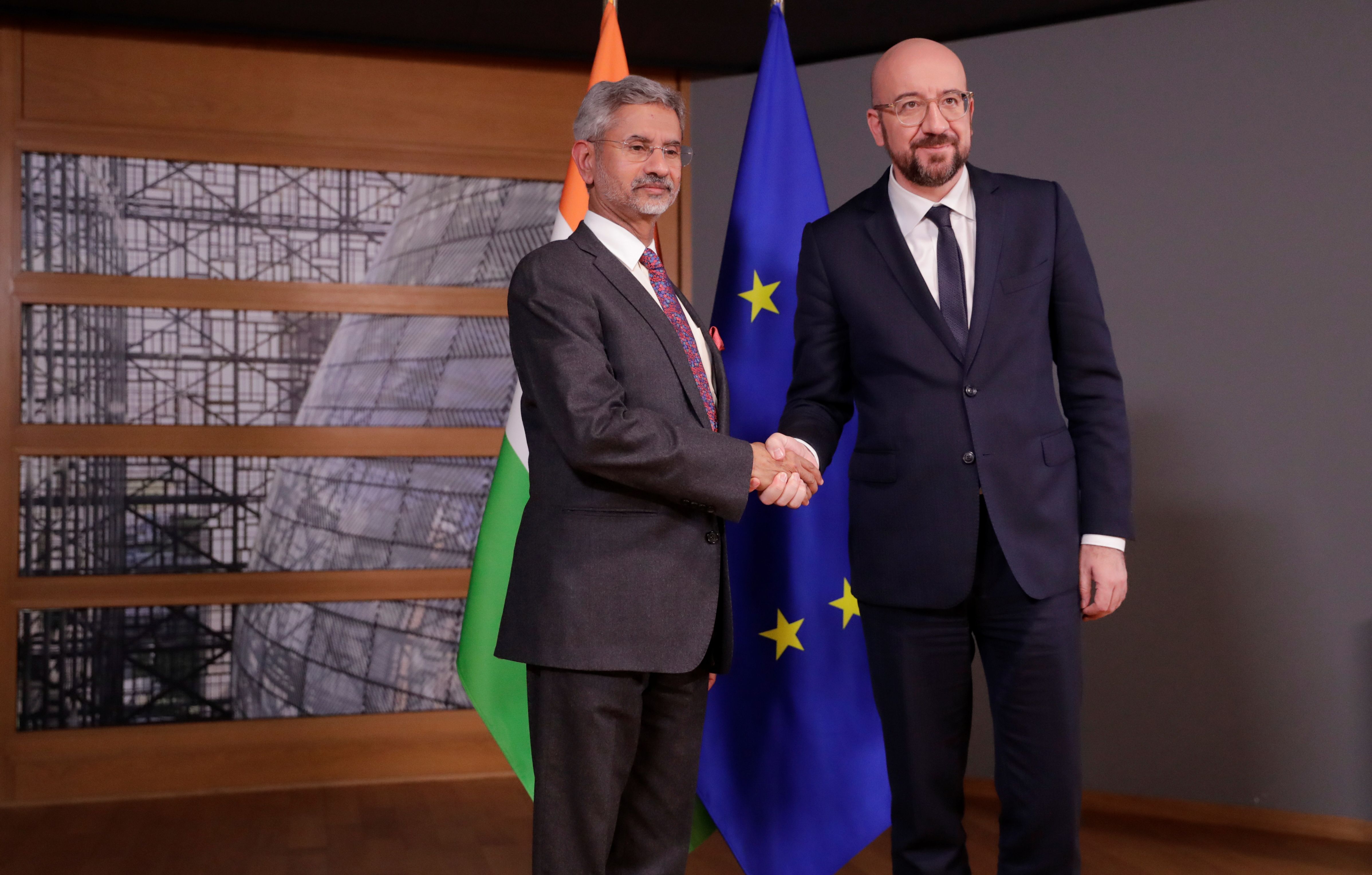Beyond Trade: Prospects and Challenges of the EU-India Global Strategic Partnership

The 15th EU-India Summit, planned for 13 March in Brussels, did not take place due to the COVID-19 pandemic, extending the gap since the last summit in 2017. This situation should not undermine plans to strengthen the strategic partnership; on the contrary, it illustrates the need for closer cooperation in tackling global challenges such as the pandemic. This should be reflected in the next joint strategy that will replace the “EU-India Agenda for Action 2020” adopted in 2016.
Favourable Circumstances
In December 2018, the EU adopted its first-ever strategy towards India, which included as an important goal to work together to strengthen the rules-based international order. However, the implementation of the document’s provisions was slow, mostly due to election to the Indian and European parliaments, which took place in May 2019. The completion of the transition to new leadership by the end of last year paved the way for a revival of cooperation.
In India, the decisive victory of the ruling Indian People’s Party (BJP) enabled the swift start of the second term of Prime Minister Narendra Modi. Importantly, the new External Affairs Minister is Subrahmanyam Jaishankar, who knows Europe very well and appreciates the importance of the EU. This former Indian ambassador in Prague (2001–2004) and career diplomat with experience in Budapest and Moscow, has repeatedly publicly acknowledged in recent months that India-EU relations have been “underperforming” and that strengthening cooperation at the supranational level will be one of his priorities.
In Europe, the new “geopolitical” European Commission (EC) formed in December 2019, which has been underlining EU “strategic autonomy” and voicing aspirations for stronger engagement in Asia, is perceived positively in India. Josep Borrell, the High Representative for Foreign Affairs and Security Policy, made his first official trip to Asia, visiting Delhi in January 2020, signalling his will to strengthen partnership with India.
The pursuit of closer cooperation is primarily fostered by changes in the international environment related mainly to the policies of the U.S. and China, which have raised concerns in Europe and India. Transatlantic tensions have led the EU to seek “like-minded partners” on multilateralism in other regions. India, which has become an object of criticism from U.S. President Donald Trump, appreciates the importance of the EU as a stabilising force. Both the EU and India share reservations about China’s growing influence in the Indo-Pacific region, as well as its Belt and Road Initiative (BRI). At the same time, they are concerned by the intensity of the U.S.-China rivalry and possible return of global bipolar competition in which they have to pick a side.
Potential Areas of Cooperation
The EU and India have a similar view on various international challenges, from the nuclear agreement with Iran to the Paris climate deal. However, this shared viewpoint has not translated into tangible results and joint actions. Therefore, it will be crucial to indicate in the new “Agenda for Action” the specific initiatives in which both sides have convergent goals and relevant competences. Security tasks, such as the fight against terrorism or maintaining maritime security, areas where most of the competences are on the side of EU Member States, have less chance of cooperation. However, there may be greater potential for it in areas of strategic importance to both partners.
On a bilateral basis, new business opportunities for European companies can be created by further involvement in India modernisation programmes in the field of climate protection, sustainable transport, urban development, etc. Increasing support may be considered, for example, by the European Investment Bank, which already finances, among others, construction of the metro in Pune and Bhopal and the development of renewable energy. At the regional level, it is worth it for both sides to support a peaceful transformation in Afghanistan, given the expected U.S. eventual military withdrawal from the country. Following the example of the Americans, the Union may offer India cooperation in the implementation of trilateral development projects in Africa or the Indian Ocean.
Cooperation at the global level will be key. Strategic challenges such as climate change, protection of the free-trade system, and multilateralism cannot be tackled without India’s involvement. An agreement between the EU and India is necessary, among others, for the success of the COP26 climate conference (which has been postponed) or the progress of talks on WTO and UN reform. The EU and India could strengthen the multilateral system by taking up a joint initiative to develop proposals for new global regimes for unregulated spaces of international relations, such as cyberspace, cybersecurity, or artificial intelligence. They may also consider joint peace initiatives in conflict regions around the world (e.g., in Yemen).
Challenges and Risks
At least three main obstacles stand in the way of closer partnership. Dealing with the effects of the COVID-19 pandemic is the newest but also the most important challenge today. The expected economic crisis in Europe may lead the Union to focus on its problems and limit its readiness for new international initiatives. Similarly, in India, the virus will contribute to a further slowdown in the economy (in 2019, GDP fell to 5% from 6.8% in 2018), especially after the total lockdown introduced in the country on 25 March. As a result, this may limit economic contacts and funding opportunities for joint projects. However, it is worth using this to strengthen bilateral cooperation in the fight against the virus (e.g., vaccine research) and propose a joint international initiative to improve public health in developing countries (e.g., using India’s potential to produce generic medicines and in biotechnology).
Second, traditional EU-India trade disputes will remain a problem, both at the bilateral level (illustrated by the impasse in negotiations on the comprehensive Bilateral Trade and Investment Agreement, or BTIA, started in 2007, and multilateral (differences in the approach to WTO reform). These disputes are structural and stem from the large disparities in the level of development. Therefore, if the BTIA talks cannot be resumed, it is worth considering adopting a less ambitious trade agreement or separate investment protection agreement that will increase the legal security of European investments in India. The positive news is that even without a free trade agreement, EU-India exchange has increased by 73% in the last decade to €92 billion in 2018 and is fairly balanced.
However, the deteriorating state of democracy in India observed in recent months may prove to be a third serious threat. The anxiety about this in Europe is caused by, among others, the restrictions imposed in Kashmir in August 2019, changes to the citizenship law that threatens discrimination against Muslims, and the recent deadly inter-religious riots in Delhi in February. This may intensify criticism of India and deteriorate the atmosphere for closer cooperation, as exemplified by a resolution critical of India being prepared in the European Parliament.
Recommendations
A fast-growing, democratic India, acting as a stabilising force in South Asia and on the Indian Ocean, is in the interests of the EU. Cooperation with India is gaining strategic importance given the growing tensions in the multilateral system. As the fifth-largest economy in the world, the globe’s most populous democracy, and an important voice for developing countries, India is an indispensable partner to the Union in tackling global challenges (such as climate change and epidemiological threats) and strengthening and reforming the current international order.
Therefore, their persistent differences in trade should not block the deepening of pragmatic cooperation in other areas. The partnership based on trade in the past must now move to the strategic level despite trade differences. A test of this will be the presentation at the next summit of specific initiatives and joint projects in areas of interest to both parties, such as the fight against the coronavirus, compromise proposals for COP26, and initiatives to regulate new areas of international affairs. Poland may support EU-India engagement and use it to intensify political and economic cooperation with India. A good opportunity for this, once the pandemic has passed, would be a long-overdue visit by the president of Poland to India.


